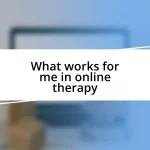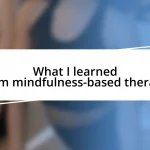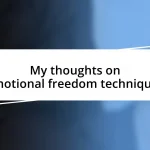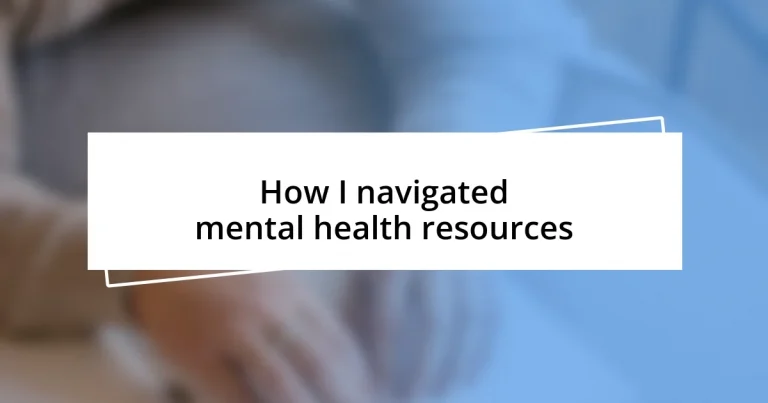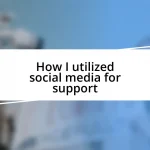Key takeaways:
- Exploring mental health resources—like community centers, online platforms, and support groups—reveal invaluable connections and coping strategies.
- Understanding personal mental health needs through self-reflection and recognizing signals helps in proactive management of one’s emotional well-being.
- Sharing experiences and vulnerabilities with others fosters a supportive community, enhancing personal growth and connection.
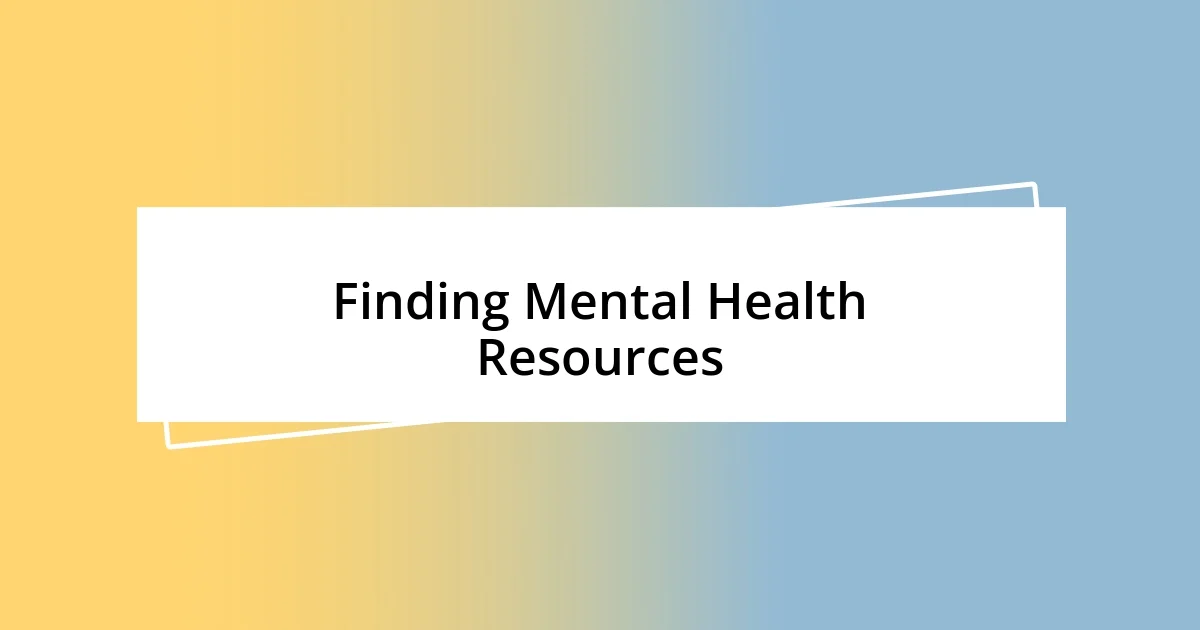
Finding Mental Health Resources
Navigating the world of mental health resources can feel overwhelming, especially when you’re not sure where to start. I remember sitting at my desk, staring at the computer screen, feeling paralyzed by choices. Have you ever felt that way? It turned out that a simple online search for local services was the first step that led me to invaluable support.
One resource that proved incredibly helpful for me was a community mental health center I discovered through a friend. The center offered free workshops on coping strategies, and I must admit, the first session felt like stepping into a safe haven. Isn’t it amazing how sharing experiences with others can lighten the burden? I found genuine connections and practical advice that made a real difference in my daily life.
Online platforms also became a lifeline during my journey. I stumbled upon forums where people shared their personal experiences and recommendations for therapists. It felt comforting to know I wasn’t alone, and hearing others’ stories inspired me to take action. Have you ever found comfort in shared vulnerability? Each resource I discovered led me to others, creating a network of support that I never knew existed.
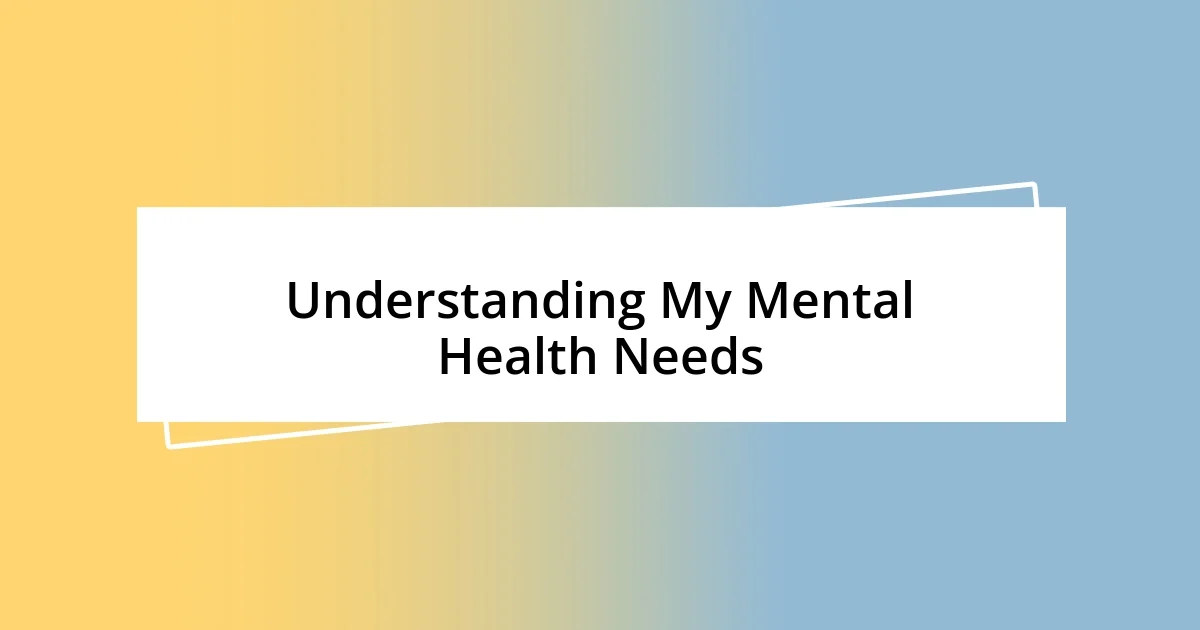
Understanding My Mental Health Needs
Understanding my mental health needs was a transformative journey. I had to confront the reality of my feelings, which often felt chaotic and confusing. At times, I found myself journaling late at night, trying to untangle the emotions that consumed me. That practice of self-reflection helped me clarify what I truly needed—compassion, understanding, and a space to heal.
I also learned to identify specific signals that indicated my mental health was slipping. Paying attention to these signs allowed me to respond proactively rather than reactively. Here’s what I focused on:
- Mood Changes: Noticing when I felt unusually irritable or sad for no discernible reason.
- Physical Symptoms: Recognizing stress-related headaches or fatigue as indicators of my mental state.
- Social Withdrawal: Acknowledging when I started to pull away from friends and family, which often meant I needed support.
- Coping Mechanisms: Understanding what methods helped me cope—like exercise or art—versus what didn’t—like isolating myself.
- Seeking Help: Remembering that reaching out for professional help is a strength, not a weakness.
Embracing these insights really underscored the importance of being in tune with my mental health and understanding my needs on a deeper level.
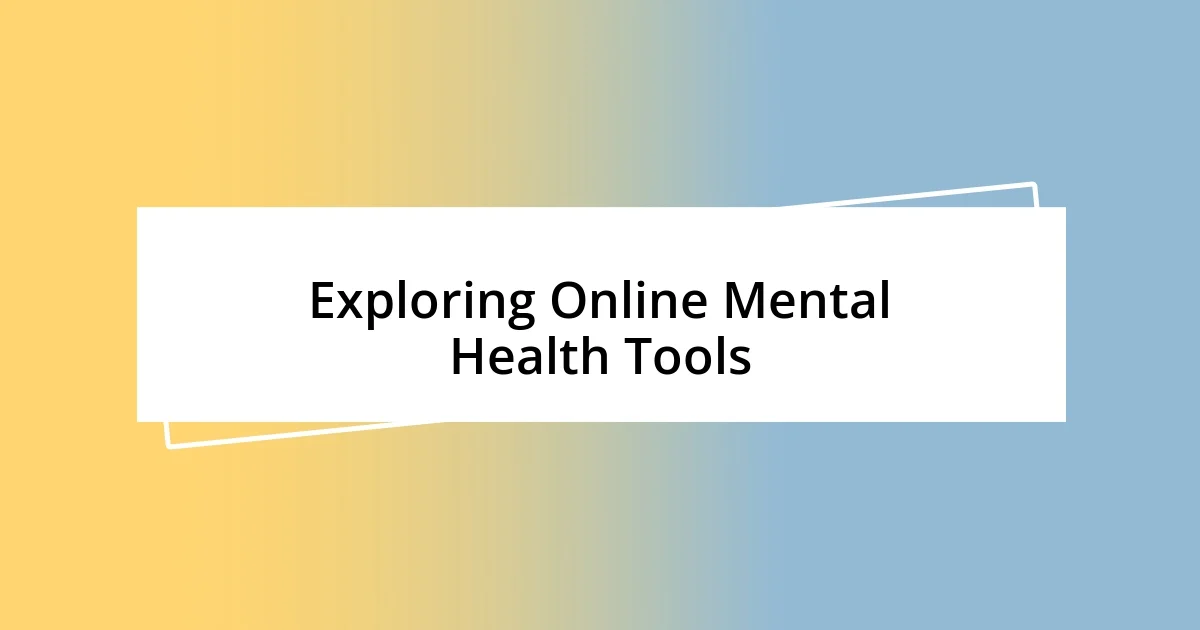
Exploring Online Mental Health Tools
Exploring online mental health tools has been an eye-opening experience for me. When I first started using these resources, I didn’t know what to expect. I remember downloading my first mental health app, feeling a mix of excitement and skepticism. It became a space where I could track my moods and look back to see patterns—something that truly helped me connect the dots in my mental health journey. Have you tried similar tools? They can offer surprising insights into your emotional landscape.
One of my favorite features in these online platforms is the access to guided meditation sessions. Initially, I found it challenging to sit still and focus, but as I persisted, I discovered a calming effect that eased my anxiety. Each session reminded me to breathe deeply and be present, which I realized was crucial during stressful times. It’s fascinating how a simple breathing exercise can create a sense of control amid chaos, isn’t it?
I’ve also explored various online therapy platforms, which helped me find professional guidance without the stress of in-person meetings. Finding a therapist who matched my specific needs took some trial and error, but the search itself felt empowering. Online resources not only made therapy more accessible but also allowed me to choose who I felt comfortable with. I learned that it’s okay to be picky when it comes to your mental well-being.
| Tool Type | Description |
|---|---|
| Mental Health Apps | Track moods, suggest exercises, and provide resources like articles and forums. |
| Guided Meditation | Audio or video sessions to promote relaxation and mindfulness. |
| Online Therapy Platforms | Cconnect with licensed therapists via video or chat, offering flexibility and privacy. |

Connecting with Local Support Groups
Connecting with local support groups was a pivotal step in my mental health journey. Initially, I was nervous about attending my first meeting; I remember pacing outside, wondering if I would fit in. But once I ventured inside, the atmosphere was warm and welcoming. It struck me how many others were navigating similar struggles—suddenly, I wasn’t alone. Has anyone else felt that sense of relief when surrounded by understanding faces?
The beauty of connecting with local support groups lies in the lived experiences we share. I recall a particular session where a member spoke about their journey through anxiety. Their vulnerability opened the floor for deeper conversations, making it easier for all of us to share our own stories. It reinforced the idea that mutual understanding fosters healing, doesn’t it? I walked away that day not just with insights but a newfound sense of community.
Finding the right local group took some time, but it was worth every effort. I experimented with different formats—some were structured with a facilitator, while others were more casual. What resonated with me were the peer-led sessions, where I found authenticity in our discussions. Engaging in those conversations highlighted the power of connection; each meeting felt like a safe space to express emotions that often felt too heavy to carry alone. Why not explore what local support could do for you? You may discover a network of hope and understanding waiting just around the corner.
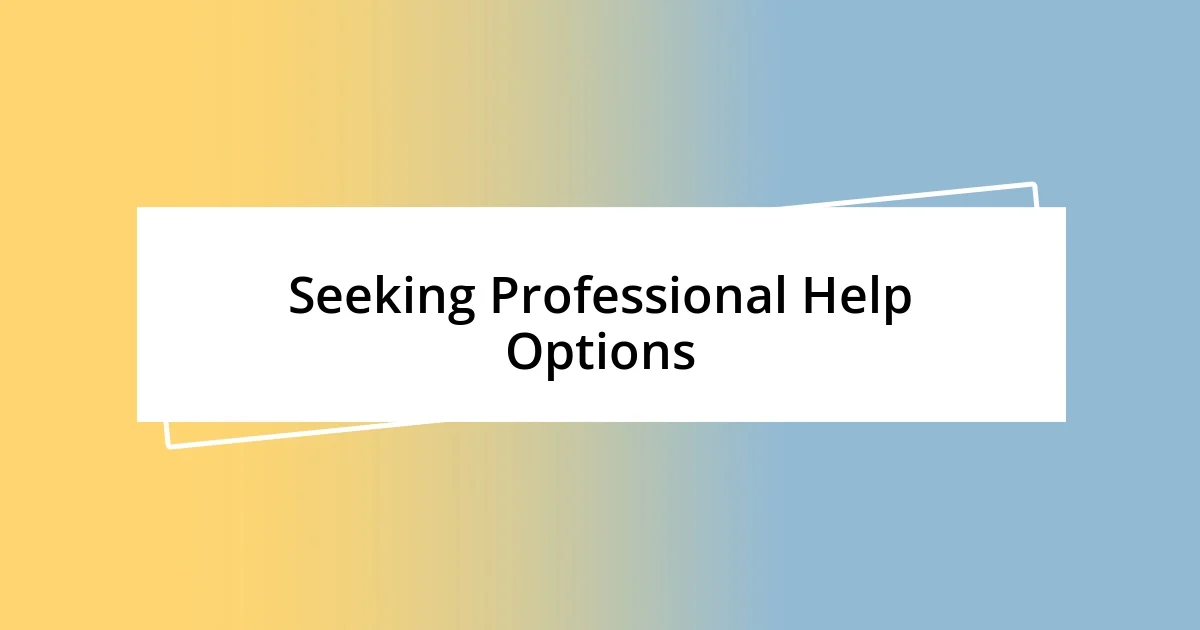
Seeking Professional Help Options
Seeking professional help is a crucial step many take in their mental health journeys. I remember my first phone call to a therapist. My heart raced with anticipation; would they understand my struggles? The process of finding the right therapist felt daunting at first, but it ultimately empowered me. What I learned is that it’s essential to feel a connection with your therapist—a rapport that makes sharing your innermost thoughts feel safe.
When exploring various professional options, I found that different therapists have unique styles. Some leaned heavily on cognitive-behavioral therapy, while others offered more holistic approaches. I recall a moment when my therapist utilized art therapy techniques with me. It was unexpected, but expressing feelings through drawing allowed me to unlock emotions I hadn’t consciously acknowledged. Have you thought about how various therapeutic techniques could resonate with you?
Additionally, reaching out to hotlines or crisis centers can provide immediate support when feeling overwhelmed. I remember a particularly tough night when I needed someone to talk to. That voice on the line provided relief and clarity I hadn’t anticipated. The importance of knowing there’s someone available at any hour can’t be overstated. Sometimes, just having a guiding hand during crises can help you find your footing again. Think about this: what if a simple conversation could shift your entire outlook?
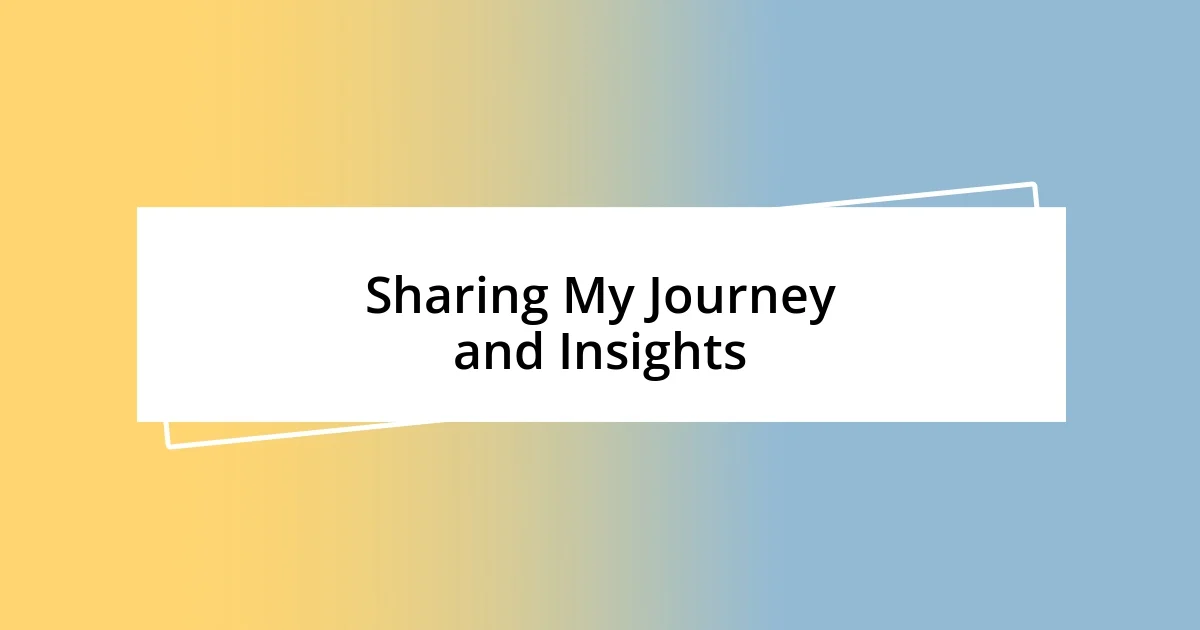
Sharing My Journey and Insights
Sharing my journey through mental health resources has been both enlightening and transformative. One of the most memorable moments for me was when I attended a workshop on mindfulness. Initially, I thought it was just another trend, but as we practiced breathing techniques, I felt the tension in my shoulders begin to ease. Have you ever experienced that unexpected relief when trying something new?
As I navigated different resources, I discovered the power of journaling. It wasn’t until I sat down with pen and paper that I realized how much I had bottled up. I remember one particular evening pouring my heart out about feelings that I hadn’t even named yet. Each word was a step toward clarity, and I began to notice patterns in my thoughts that I had previously overlooked. Have you considered how writing your thoughts down could help you make sense of your emotions?
I’ve also found that sharing these experiences with friends has been incredibly enriching. When I opened up to a close friend about my therapy sessions, I was surprised by how much they appreciated my honesty. It sparked a deep conversation about their own challenges, and we began exchanging resources and coping strategies. Isn’t it fascinating how vulnerability can strengthen bonds and create a supportive dialogue? Sharing my journey not only helped me but also allowed others to feel less alone in their struggles.
